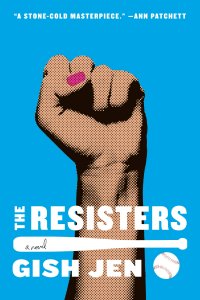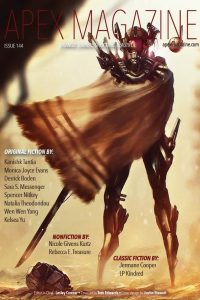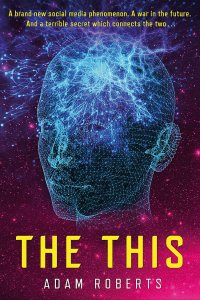Ian Mond Reviews The Resisters by Gish Jen
 The Resisters, Gish Jen (Knopf 978-0525657217, $26.95, 320pp, hc) February 2020.
The Resisters, Gish Jen (Knopf 978-0525657217, $26.95, 320pp, hc) February 2020.
As an Aussie, I do love my cricket, but I’m the first to admit that some of the most memorable fiction and non-fiction I’ve read features America’s favourite summer-sport, baseball. This includes Thomas Dyja’s stunning civil war novel Play for a Kingdom, where Union and Confederate companies play a series of baseball games between each battle; Stephen King’s absorbing essay “Head Down”, where he spends the summer reporting on the fortunes of Owen King’s little league team; and possibly my all-time favourite fantasy novel, Michael Bishop’s Brittle Innings, where (spoilers) Frankenstein’s monster plays a season for the Chattahoochee Valley League in the American Deep South during the Second World War. (If I haven’t mentioned W.P. Kinsella’s Shoeless Joe it’s not because I found the Kevin Costner adaptation mawkish and cheesy, but because I’ve never read the novel). While not much can compare to those works (and particularly Brittle Innings, which is criminally under-read), Gish Jen’s The Resisters comes close, pulling off the feat of making the unlikely pairing of baseball and a dystopian setting seem like a natural fit.
The Resisters is set at a point in the future where widespread automation has split America (now AutoAmerica) into two classes of people. There are the “Netted” who continue to have jobs and enjoy a life of privilege and wealth, and there are the “Surplus” who have been made redundant by AutoHouses, AutoLawns, AutoLawyers, and AutoSurgeons. The Surplus are paid a Basic Income (Andrew Yang-style), which they’re required to spend on products manufactured by the Netted, and they earn “Living Points” that provide them with limited freedoms. All this is governed by an Artificial Intelligence (dubbed Aunt Nettie) that keeps the Surplus in check via an army of drones and human enforcers. Into this automated world comes Gwen, who, at a young age (just like Roy Hobbs), shows an aptitude at accurately throwing spherical objects (well, frankly any object). However, a Surplus-wide ban on free-association means that Gwen can’t play baseball. Cue Gwen’s mother Eleanor. Famous (or infamous) for defending the civil rights of all Surplus (a role that has led to her incarceration and torture), Eleanor decides to establish an underground baseball league. Surprisingly, when Aunt Nettie becomes aware of the league it doesn’t shut it down. Instead, recognising Gwen’s skill with a baseball – and the role she might play in defeating the ChinRussians at the Olympics – Aunt Nettie offers Gwen a scholarship at Net U (Netted University) to further harness her talent. It’s an opportunity that most Surplus would jump at, but as Eleanor’s daughter Gwen appreciates there’s more at stake than her prodigious southpaw.
Whether it’s the Organisation for Economic Cooperation and Development (OECD), experts from Stanford, or the World Bank’s Chief Economist, the prevailing view is that the effects of automation have been vastly overstated, the AI takeover as characterised by Gish Jen is unlikely to eventuate (despite Amazon’s best efforts). The Resisters, though, isn’t so much about the long-term dangers of automation. Rather, in portraying an American dystopia where baseball – a symbol of freedom and the American dream – is played in secret and where zoning laws have forced the Surplus to live in swampland, Jen not only echoes the discriminatory policies of redlining but also amplifies contemporary concerns about income equality, the whittling away of civil liberties, and limited access to essential services in the poorer parts of the US (for example the five-year water crisis in Flint MI).
The Resisters, as the title suggests, is also a novel about fighting against all forms of authoritarianism – human or AI. For Jen, it’s the mothers who will inspire their daughters to withstand gross injustice. This is illustrated, somewhat tongue in cheek, via the aphoristic words of wisdom Gwen’s father attributes to his mother: “as my mother used to say, a secret is a shame or a treasure,” “as my mother used to say, Goats don’t jump, their feet jump;” and “as my mother used to say, No paint job could cover that.” More notably, it’s the courage exhibited by Eleanor, who, in the face of “distinguished treatment” (AKA torture), continues her ongoing legal battle against Aunt Nettie to ensure that Constitutional and human rights of all Surplus are protected. The novel’s denouement (which I won’t spoil) brings this to the fore in a manner that cleverly plays against the traditional baseball-movie climax and sees the baton of hope and resistance passed on to the next generation. With The Resisters, Gish Jen provides a new angle to the dystopian narrative, while doing justice to that great American literary sport: baseball.
Ian Mond loves to talk about books. For eight years he co-hosted a book podcast, The Writer and the Critic, with Kirstyn McDermott. Recently he has revived his blog, The Hysterical Hamster, and is again posting mostly vulgar reviews on an eclectic range of literary and genre novels. You can also follow Ian on Twitter (@Mondyboy) or contact him at mondyboy74@gmail.com.
This review and more like it in the February 2020 issue of Locus.
 While you are here, please take a moment to support Locus with a one-time or recurring donation. We rely on reader donations to keep the magazine and site going, and would like to keep the site paywall free, but WE NEED YOUR FINANCIAL SUPPORT to continue quality coverage of the science fiction and fantasy field.
While you are here, please take a moment to support Locus with a one-time or recurring donation. We rely on reader donations to keep the magazine and site going, and would like to keep the site paywall free, but WE NEED YOUR FINANCIAL SUPPORT to continue quality coverage of the science fiction and fantasy field.





